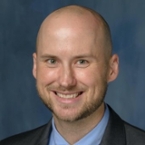Prepare to be an exceptional and compassionate internist through our residency in internal medicine, with a broad exposure to clinical experiences and protected didactic time in a supportive environment

Our community of residents, faculty and staff are here to support you through the most exciting and challenging time of your life. We pride ourselves on creating a culture that replaces the typical hierarchy of medical education with a learning environment defined by mutual respect, intellectual curiosity, and resident teamwork, while preserving resident autonomy in clinical decision making. We welcome residents with diverse backgrounds from all over the world.
The Hospitalist Training Track is designed to provide residents interested in careers in hospital medicine and healthcare leadership with training and exposures to principles and topics within the specialty beyond the existing residency curriculum. The track focuses on residents' professional development through small group sessions, select clinical rotations, and close faculty mentorship. To learn more click here!
The Primary Care Track was created in 2010 by a group of residents to provide robust and comprehensive training in ambulatory care and chronic disease management. Residents from each class may choose to enter the track during the second-half of their intern year or during their second year. The curriculum is embedded into the traditional R2 and R3 years. To learn more click here!
The Integrative Medicine Track is designed to offer categorical residents additional training and education using the tools and philosophy of Integrative Medicine. The track was developed by residents, with the help of faculty, with the passionate goal to build integrative medicine expertise through self-guided and hands-on educational experiences. The curriculum is taught in a longitudinal manner over 2-3 years and is based on the Andrew Weil Integrative Medicine modules designed for Internal Medicine residents. To learn more click here!
The University of New Mexico (UNM) is one of a handful of programs across the country participating in the Internal Medicine Nephrology Pathway (IMNP). IMNP is an Advancing Innovation in Residency Education (AIRE) pilot program that has been approved by the Accreditation Council for Graduate Medical Education (ACGME). This forward-thinking initiative allows motivated and qualified trainees to complete both Internal Medicine and Nephrology training in four years, rather than the traditional five. Though increased exposure to nephrology starts during the residency portion of the pathway, trainees will ultimately complete roughly 2.5 years of internal medicine training followed by 1.5 years of nephrology training and be ABIM board-eligible in both specialties.
The IMNP is designed for select residents who meet eligibility criteria and demonstrate readiness for subspecialty training earlier in their residency. The curriculum integrates core requirements from both specialties, with carefully coordinated transitions and shared evaluations throughout the four-year pathway. This pilot aims to improve training efficiency while maintaining educational standards and clinical competency.
Residents have multiple opportunites for learning during afternoon reports, Internal Medicine Grand Rounds, Morbidity and Mortality Conferences, journal clubs, and our own academic half day.
We offer protected half days on Thursday afternoons for residents to engage with our internal medicine curriculum. The academic year kicks off with bootcamp, where interns and residents are split to get dedicated time to practice skills pertinent to their level of training. These sessions focus on Point Of Care Ultrasounds (POCUS), procedures, simulation, and essential skills in efficiency and communication. After bootcamp, the majority of the educational half days are devoted to our core internal medicine curriculum - designed to train residents as excellent internists and help them prepare for the American Board of Internal Medicine (ABIM) Exam.
The first half of the year focuses on common internal medicine diagnoses and medical emergencies that residents will encounter most frequently in the hospital. The remainder of the year is devoted to expanded topics within each subspecialty. The curriculum repeats twice over a three-year period to ensure that residents can engage with each topic several times over the course of their residency. In addition to this core internal medicine content, our Thursday School curriculum also includes dedicated board review sessions, house officer meetings, and conferences focused on topics in DEI, communication, and quality improvement.
Afternoon report takes place every Monday, Wednesday, and Friday at both the University Hospital and the VA. It primarily includes case-based discussions presented by upper-levels on wards as well as sessions focused on board review using games, Master Clinician series with subspecialists presenting interesting cases, quality improvement didactics, and so much more! We find this time to be ideal for our seniors to learn how to engage an audience and teach their peers in a low-stress environment using innovative techniques.
During dedicated Yweeks, our outpatient faculty follow an outpatient didactic curriculum, given prior to clinic sessions. It covers core primary care topics and follows the American Board of Internal Medicine (ABIM) curriculum in a structured format
Interns are engaged in learning about Quality Improvement and Patient Safety (QIPS) during dedicated Thursday School sessions and will complete the Institute for Healthcare Improvement (IHI) basic certificate by the end of their first year. Upper levels are expected to start a QIPS project during their second year with continuous Patient Data Safety Analysis (PDSA) cycles enacted during their third year. Thursday School sessions for upper-levels will focus on workshopping these experiences. During Yweeks, one half day will be dedicated to QIPS projects.
Our QIPS Chief Residents at UNM and the VA will service as a resource, with the goal of presenting completed projects at local and national conferences. In addition, Morbidity & Mortality Conferences are held monthly in place of Afternoon Report, allowing residents to engage directly in Root Cause Analyses while learning about opportunities for improvement.
Our program allows the flexibility and autonomy for residents to create their own electives such as medical education, transplant medicine, and radiation oncology.
In addition to standard medicine subspecialties and outpatient electives (like dermatology, ophthalmology, orthopedics, women’s health), we also are very proud of our non-traditional electives. These include medical economics, toxicology, integrative medicine, transfusion medicine, and heme-pathology.
Off-site locations for our residents allow them to see and experience Internal Medicine outside of the traditional academic setting. This includes hospitalist rotations at urban and rural sites in New Mexico as well as rotations on the Navajo Nation.
Opportunities to pursue research your intern year allow preparation for applying for fellowship your second year. All categorical residents complete a Scholarly Project and many of our residents do several. For those who want to complete more in-depth projects, residents can complete up to three months of research electives.
Our program allows the flexibility and autonomy for residents to create their own electives such as medical education, transplant medicine, and radiation oncology.
In addition to standard medicine subspecialties and outpatient electives (like dermatology, ophthalmology, orthopedics, women’s health), we also are very proud of our non-traditional electives. These include medical economics, toxicology, integrative medicine, transfusion medicine, and heme-pathology.
Off-site locations for our residents allow them to see and experience Internal Medicine outside of the traditional academic setting. This includes hospitalist rotations at urban and rural sites in New Mexico as well as rotations on the Navajo Nation.
Opportunities to pursue research your intern year allow preparation for applying for fellowship your second year. All categorical residents complete a Scholarly Project and many of our residents do several. For those who want to complete more in-depth projects, residents can complete up to three months of research electives.

I have so cherished training amist our IM department's simultaneous dedication to clinical rigor and health equity. I have trained in many county hospitals celebrated for their "pathology," but this is the first where internists consistently embrace the responsibility of the safety net (the only one in the state!) with an obvious dedication to humanism and patient-centered care for the vulnerable population we serve, and all the while with a supportive culture for all their colleagues and trainees putting in the same extra effort for our community.
Office of Education
Department of Internal Medicine
MSC 10-5550
1 University of New Mexico
Albuquerque, NM 87131
Phone: 505-272-6331
Email: DOIM-Residency-Staff@salud.unm.edu
Click Submit a Verification of Training request